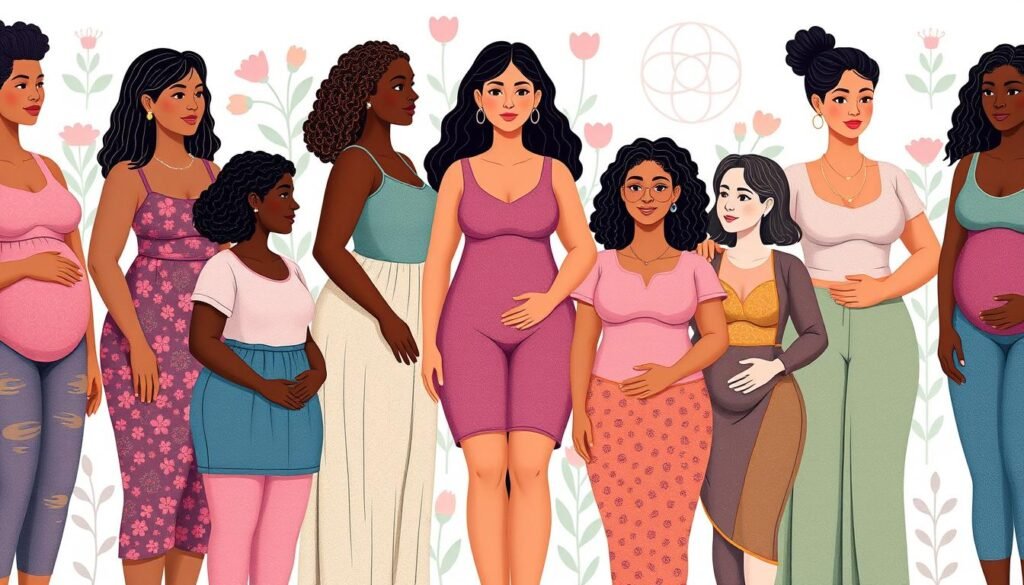About 23.1% of women with polycystic ovary syndrome (PCOS) experience depression. This is higher than the 19.3% seen in women without PCOS. The Connection Between Mental Health and PCOS shows how deeply this condition affects one’s feelings. Hormonal issues in PCOS, like insulin problems and excess male hormones, can lead to mental health issues. These include anxiety, depression, and bipolar disorder. This affects many aspects of a woman’s life.
One-third of women with PCOS may have trouble getting pregnant. It’s crucial to see PCOS’s big-picture impacts. Reviews suggest that a total care plan is needed. This plan should tackle both the physical and emotional sides of PCOS. Also, stigma and wrong ideas about PCOS make these mental health challenges even harder. For more on PCOS and mental health, read this informative resource.
Key Takeaways
- 23.1% of women with PCOS experience depression, compared to 19.3% in control groups.
- Up to 11.5% of PCOS patients suffer from anxiety, exceeding rates found in control populations.
- The prevalence of PCOS affects between 6% to 26% of women globally.
- PCOS is linked to fertility challenges, affecting around one-third of those diagnosed.
- Addressing the mental health aspects of PCOS is crucial for comprehensive care.
- Stigmatization of PCOS continues to hinder understanding and support for affected women.
Understanding Polycystic Ovary Syndrome (PCOS)
Polycystic Ovary Syndrome (PCOS) is a complex hormonal disorder. It impacts many people all over the world. Understanding PCOS symptoms is key for early diagnosis and managing the condition effectively.
Definition and Symptoms of PCOS
PCOS includes reproductive and metabolic problems due to hormonal imbalances. Common symptoms include:
- Irregular menstrual cycles
- Hyperandrogenism, including symptoms like hirsutism and acne
- Weight gain or trouble losing weight
- Infertility
Diagnosis follows the Rotterdam criteria, requiring two out of three signs: signs of hyperandrogenism, issues with ovulation, and polycystic ovaries. Knowing these symptoms helps understand the impact of hormonal imbalances in PCOS.
Hormonal Imbalances Associated with PCOS
Hormonal imbalances are central to PCOS, affecting both body and mind. Insulin resistance is notable, often worsening hyperandrogenism. This leads to an increase in male hormones, presenting many challenges for those with PCOS symptoms, and affects their life quality.
| Hormonal Imbalance | Impact on Health |
|---|---|
| Insulin Resistance | Increases risk of weight gain and metabolic syndrome; may contribute to depression |
| Hyperandrogenism | Leads to symptoms such as hirsutism and acne; associated with mood disorders |
| Luteinizing Hormone (LH) Dysfunction | Affects ovulation, leading to irregular menstrual cycles |
Understanding PCOS and its symptoms, including hormonal imbalances, helps healthcare providers and patients address the condition’s physical and psychological sides. Knowing about insulin resistance and hyperandrogenism is crucial for comprehensive management of PCOS. It aids in creating targeted interventions for both hormonal and mental health issues.
The Prevalence of PCOS and Its Impact on Women
Polycystic Ovary Syndrome (PCOS) deeply affects many women around the globe. It touches about 8–13% of women who are in their childbearing years. The statistics on PCOS highlight that up to 70% of women suffering from it might not even know, pointing out the need for more awareness and knowledge on this matter. Through understanding the demographics of PCOS, we learn it affects women across all ethnic backgrounds, showing it’s a key issue for public health.
Demographics and Statistics on PCOS
The worldwide rates of PCOS show a wide range, from 3.4% to 32.5%. It seems certain ethnicities are more likely to get this condition, which suggests genetics play a big part in the risk. Women with a family background of PCOS or type 2 diabetes are especially prone to developing it themselves. Key signs of PCOS include irregular menstruations, problems getting pregnant, acne, and putting on extra weight.
| Demographic Factor | Statistics |
|---|---|
| Global Prevalence | 3.4% to 32.5% |
| Women Remaining Undiagnosed | Up to 70% |
| Common Symptoms | Irregular periods, acne, infertility, weight gain |
| Increased Risk Factors | Family history of PCOS/Diabetes |
Long-term Health Implications of PCOS
Long-term implications of PCOS go way beyond fertility issues. Ladies with PCOS face a higher chance of developing serious ailments like type 2 diabetes, heart disease, and even endometrial cancer. PCOS can also lead to mental struggles, including anxiety and depression. This means taking care of PCOS properly needs a plan that looks after both the mind and the body.

Psychosocial Aspects of PCOS
PCOS affects women in ways that often stay hidden. Understanding its overall impact is critical. It brings emotional challenges and social pressures. Symptoms like weight gain and excessive hair growth cause self-doubt.
The stigma attached to PCOS hinders open conversation, leading to women feeling alone. Creating supportive communities is vital.
The Invisible Struggle of Living with PCOS
Living with PCOS means facing unseen challenges. Many in society don’t understand this, adding to the emotional burden. Research shows close to 64.1% of women with PCOS develop depression related to their condition.
Misunderstandings label PCOS as just a reproductive issue or blame it on lifestyle. This leaves those affected feeling left out. Indeed, 8% to 13% of women in their reproductive years are fighting PCOS. This also includes struggles with anxiety and eating disorders.
Stigmas and Misconceptions Surrounding PCOS
Stigmas linked to PCOS stem from widespread misconceptions. This often leads to shame. Many view PCOS as only a cosmetic issue, not seeing the deep emotional and life impacts.
Misconceptions can delay diagnosis and treatment. This silence makes the journey harder for many women. Raising awareness and understanding is key to breaking down these stigmas and offering needed support.

| Aspect | Impact |
|---|---|
| Emotional Struggles | 64.1% experience depressive disorders |
| Social Isolation | Feelings of inadequacy due to stigma |
| Misconceptions | Framing PCOS as only a reproductive issue |
| Diagnosis Delay | Up to 70% remain undiagnosed |
| Quality of Life | Significantly lower compared to non-PCOS peers |
The Connection Between Mental Health and PCOS
Polycystic Ovary Syndrome (PCOS) greatly affects women’s mental health. Understanding the connection between PCOS and mental health is key. Women with PCOS often feel more stressed than those without it. They are more likely to have mental health disorders in PCOS, including anxiety and depression.
Link Between PCOS and Mental Health Disorders
Research shows that women with PCOS have a higher chance of feeling anxious. These feelings are linked to symptoms like irregular periods and concerns about appearance. Many women with PCOS feel just as stressed as those with psychiatric conditions.
Knowing these facts highlights the need for better awareness and treatment options.
Understanding Anxiety and Depression in PCOS Patients
Depression in women with PCOS is often deep, affected by social and fertility worries. Issues like excessive body hair and menstrual problems add to their anxiety and depression. This situation urges doctors to pay close attention to the mental health of PCOS patients.
Advice found in health articles and tips from stress reduction techniques are crucial for managing these issues.
| Aspect | Prevalence in PCOS | General Population |
|---|---|---|
| Anxiety | 28% to 39% | Varies by study |
| Depression | 11% to 25% | Varies by study |
| Psychiatric Distress | Higher than general population | Lower levels |
| Irregular Menstrual Cycles | Strong predictor for mental health issues | N/A |
This table shares important data on mental health in women with PCOS versus the general population. It shows why special mental health care for these women is essential.
Hormonal Influences on Mental Health
It’s important to connect hormonal changes to mental health, especially for those with polycystic ovary syndrome (PCOS). People with PCOS face insulin resistance, which can affect how they feel emotionally. This resistance can make feelings of anxiety and sadness worse, showing how our bodily hormones impact our mental state.
Role of Insulin Resistance and Androgens
About 75% of women with PCOS deal with insulin resistance. This condition doesn’t just relate to physical health problems. It’s also linked to mood issues. The hormonal ups and downs can also change androgen levels, affecting how a person feels.
High testosterone levels in women with PCOS can upset their emotional balance. This makes it important for treatments to look at hormone interactions. Depression is much more common among these women, up to eight times more than others. Balancing insulin and hormone levels is key to better health.
Neurotransmitter Imbalances in PCOS
Studies show that neurotransmitters play a role in PCOS, especially serotonin’s effect on mood. Women with long-term high androgen levels might have trouble with serotonin, leading to anxiety and depression. These neurotransmitter issues add to the stigma of mental health in PCOS.
Targeted treatments that address these imbalances are crucial. They help improve mental health while also managing physical symptoms. Knowing about these connections gives women the power to find the right help and treatments for their unique situations.

Physical Symptoms of PCOS Affecting Mental Health
Physical symptoms of Polycystic Ovary Syndrome (PCOS) impact mental health in many ways. Issues with body image and self-esteem are closely related in PCOS. Symptoms like weight gain, acne, and excessive hair growth can make someone feel not good enough.
Many women feel embarrassed and have low self-worth because of these symptoms. It is crucial to address these concerns with supportive care. This helps build mental strength. We must understand how physical issues affect emotions to improve mental health.
Impact of Body Image and Self-esteem
Visible symptoms of PCOS can make women struggle with self-esteem. These symptoms don’t fit societal beauty norms. They can lead to negative self-images, anxiety, and depression.
Learning to view oneself positively is key. It requires mental health efforts. Support from friends, family, or healthcare pros is critical for better handling of these issues.
Menstrual Irregularities and Psychological Effects
Many women with PCOS have irregular periods, which affects their mood. This uncertainty can lead to worries about fertility and identity. It makes planning for a future family stressful.
It is important to understand how menstrual issues affect the mind. Therapies that lessen anxiety and help women feel in control are very helpful.
For those with PCOS, dealing with both physical and emotional issues is key for a better life. Knowing more about how these challenges are connected can encourage women to get the right help. For more on PCOS and mental health, click here.
Lifestyle Interventions for Managing Mental Health in PCOS
Lifestyle changes are key in supporting mental health for women with polycystic ovary syndrome (PCOS). Focus on diet and exercise can greatly improve both physical and mental health.
Dietary Changes and Their Mental Health Benefits
Changing your diet can have big mental health benefits of diet. Eating more vegetables and legumes can lower anxiety and depression. However, diets high in sugar may up mental health risks. Personalized diet advice is crucial for handling PCOS mentally and physically.
Exercise and Stress Management Techniques
Regular exercise is vital for PCOS management. It reduces anxiety and depression, boosting emotional health. Using stress management for PCOS techniques like mindfulness also helps mental health. Exercise and stress reduction work together for better PCOS management.
Studies stress the value of these interventions. Reviewing their success shows how they help with mental health in PCOS cases. For detailed analysis, check mental health interventions for PCOS.
Seeking Support: Treatment Options for PCOS Patients
Polycystic Ovary Syndrome (PCOS) is complex, needing a broad approach. Women face both physical and mental challenges. Lifestyle changes, medications, and psychological help are key in treatment.
Medications and Psychological Therapies
For PCOS, there are meds for hormonal balance and mental health. SSRIs help with depression seen in about 30% of women with PCOS. Also, birth control pills can lower anxiety and better mood for some.
Cognitive behavioral therapy (CBT) helps manage emotional distress from PCOS. It teaches coping skills. Healthcare providers should watch emotional health closely and refer to mental health experts if needed.
Support Networks and Community Resources
Support networks are crucial for emotional health in PCOS. Local and online groups offer a space to share and connect. Helplines and organizations provide tips on treatments and community help.
Here is a table showcasing some of the key PCOS treatment options and associated community resources:
| Treatment Option | Description | Community Resource |
|---|---|---|
| Medications for PCOS | Medications to manage hormonal imbalances and mental health symptoms include SSRIs and metformin. | Local endocrinology clinics or gynecologists specializing in PCOS. |
| Cognitive Behavioral Therapy (CBT) | Therapy to develop coping mechanisms for anxiety and depression. | National mental health organizations offering referrals to therapists. |
| Online Support Groups | Forums where women can share personal experiences and receive support. | Platforms like Facebook groups and dedicated PCOS websites. |
| Healthy Lifestyle Changes | Dietary modifications and regular exercise to manage symptoms. | Community wellness programs and local fitness centers. |
PCOS treatment includes more than just doctor visits. It involves community support and holistic ways tailored to each woman. This way, ladies with PCOS can improve their health and happiness.
Conclusion
Knowing how mental health and PCOS are linked is key for good treatment and support. It’s clear that PCOS heavily affects women’s mental and emotional health. Between 34% and 57% of women with PCOS feel more anxious. Also, 28% to 64% might have depression.
Recent studies show that women with PCOS often struggle with anxiety and depression. This can also harm their quality of life. By looking at both physical health and emotional well-being, we can help these individuals. They need help with hormonal issues and the social stressors they face.
Care should be all-encompassing, with education, community backing, and therapies for both mind and body. Focusing on mental health in PCOS allows women to better manage their condition. This improves their life quality and overall happiness.